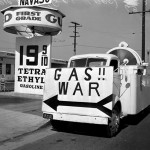
I was talking to a client today about competition and lowest price, in the never-ending battle to win sales and market share. It reminded me of what we referred to as “gas wars” during the sixties and early seventies. With a service station on every corner, there was fierce competition. One station would lower their price by a penny and within minutes the other stations would follow. The war was on and it wouldn’t stop until all stations were losing money and then prices would go up again. No one won, they all lost. People didn’t buy any more gas when the price was lower and no station was able to capture an increased loyal customer base. In reality, the service stations all went on a “profit holiday” and the consumers ended up with more money in their pockets.
Years ago when I worked in the steel industry, the iron ore producers positioned themselves quite differently. When one producer would publish their price for iron ore, the other producers would follow suit. The same price was offered by all producers and no one broke rank. They realized the futility in lowering price to gain sales and increase market share. They knew that there were more factors in determining sales than just price and that regardless of price, the other factors had greater influence. Those other factors included the reputation of the supplier, location, transportation costs, quality of product, long term relationships, partnerships, salesperson, and many others.
Now back to my discussion with the President of my client company. Salespeople have the opportunity to sell four things to every customer and the salesperson’s skill and ability to sell these four things accounts for the profitability, volume and market share of their products or services. Here are the four things that can be sold, listed in order of importance.
- Salesperson: Sell the salesperson (yourself) first. People buy from people they believe, like and trust. I have seen it time and time again, a buyer willing to paying more money for a product due to just one factor; they trusted the salesperson.
- The Company: People make buying decisions based on the reputation of the company that produces or represents the products and or services. They want to know that someone will be there for them. They want comfort and security, plain and simple.
- The Product: Present your product in terms of how it can specifically meet the needs and solve the problems of the buyer. Even though products may appear to be similar, sell the unique features and characteristics found in your product.
- Price: Anyone can offer a lower price and deliver a disappointing product. Savvy buyers understand the relative insignificance of price as compared to the value of the first three items mentioned above. I firmly believe that the importance of price pales in comparison to the value of the salesperson, the reputation of the company and the quality of the product. What have you benefitted if the product is incapable of doing what it was intended to do, or if it is not received in time to accomplish its purpose?
When your value proposition, which is comprised of trust in the salesperson, the reputation of the company and the unique qualities of the product, is greater than that of your competition, you will enjoy greater profits without prostituting your price. Let your competition acquire all the low priced sales they can afford while you take your profits to the bank




Sorry, the comment form is closed at this time.